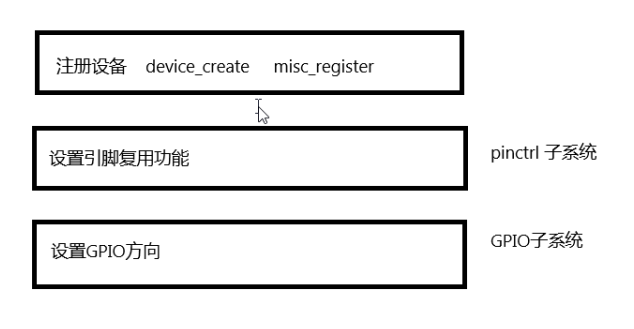《嵌入式驱动(六):pinctrl子系统和gpio子系统驱动》
一、Linux驱动分层思想

1.设备与驱动分离思想
和设备相关的信息放到设备树里,驱动里面只写对于设备的操作方法
2.驱动分层思想
把相同的操作提出来,构建子系统,子系统可以完成这些通用的操作(GPIO,引脚)
二、pinctrl子系统(linux内核中自带该系统)
我们通过设备树来使用pinctrl子系统。pinctrl子系统中有2个概念:
pin controller(一种引脚的定义和实现):它对应IOMUX来复用引脚
client device(使用某种引脚定义方向):pinctrl子系统的客户,即使用pinctrl系统的设备。
在imx6ull-alientek-emmc.dts文件中iomuxc节点中定义controller引脚配置
pinctrl_putekey: putekey {
fsl,pins = <MX6UL_PAD_UART1_CTS_B__GPIO1_IO18 0xf0b0>;
};
在对应的putekey节点中引用该方案
putekey {
#address-cells = <1>;
#size-cells = <1>;
compatible = "pute-key";
pinctrl-names = "default";
pinctrl-0 = <&pinctrl_putekey>;
reg = <0x209C004 0x4
0x209C000 0x4>;
status = "okay";
};
三、gpio子系统
在设备中指定节点使用的GPIO引脚编号
1. 在设备中指定节点使用的GPIO引脚编号,格式如下:
putekey {
#address-cells = <1>;
#size-cells = <1>;
compatible = "pute-key";
pinctrl-names = "default";
pinctrl-0 = <&pinctrl_putekey>;
gpio-key = <&gpio1 18 GPIO_ACTIVE_LOW>;
status = "okay";
};
在putekey节点里面修改
2. 在驱动中编写代码
2.1.通过of_get_named_gpio从设备树节点中解析并获取指定GPIO硬件编号
2.2.通过gpio_request申请GPIO资源
2.3.通过gpio_direction_input/output设置GPIO的方向
2.4.通过gpio_get_value 读取输入引脚电平
gpio_set_value设置输出引脚电平
2.5.释放GPIO,gpio_free()
四、代码
以key为例
pinctrl子系统
pinctrl_putekey: putekey {fsl,pins = <MX6UL_PAD_UART1_CTS_B__GPIO1_IO18 0XF0B0>;}; gpio子系统
putekey {#address-cells = <1>;#size-cells = <1>;compatible = "pute-key";pinctrl-names = "default";pinctrl-0 = <&pinctrl_putekey>;gpio-key = <&gpio1 18 GPIO_ACTIVE_LOW>;status = "okay";};
key_app.c
#include <stdio.h>
#include <sys/types.h>
#include <sys/stat.h>
#include <unistd.h>
#include <fcntl.h>int main(void)
{int fd = 0;int stat = 0;fd = open("/dev/misc_key", O_RDWR);if (-1 == fd){perror("fail to open");return -1;}while (1){read(fd, &stat, sizeof(stat));printf("stat = %d\n", stat);}close(fd);return 0;
}Makefile
#模块名
modulename := key_app#编译工具链
CC := arm-linux-gnueabihf-gcc all:$(CC) $(modulename).c -o $(modulename)cp $(modulename) ~/nfs/rootfs .PHONY:
clean:rm $(modulename)
distclean:rm $(modulename)rm ~/nfs/rootfs/$(modulename)key_drv.c
#include <linux/init.h>
#include <linux/cdev.h>
#include <linux/fs.h>
#include <linux/module.h>
#include <linux/miscdevice.h>
#include <linux/of_address.h>
#include <linux/of.h>
#include <asm/uaccess.h>
#include <asm/io.h>
#include <linux/of_gpio.h>
#include <linux/gpio.h>static struct device_node *pkeynode = NULL;
static int gpiokey = 0;static ssize_t key_read(struct file *fp, char __user *puser, size_t n, loff_t *off)
{int status = 0;unsigned long nret = 0;if (gpio_get_value(gpiokey)) {status = 0;} else {status = 1;}nret = copy_to_user(puser, &status, sizeof(status));if (nret) {pr_info("copy_to_user failed\n");return -1;}return nret;
}static struct file_operations fops = {.owner = THIS_MODULE,.read = key_read,
};static struct miscdevice misc_key = {.minor = MISC_DYNAMIC_MINOR,.name = "misc_key",.fops = &fops,
};static __init int key_drv_init(void)
{int ret = 0;ret = misc_register(&misc_key);if (ret) {pr_info("misc_register failed\n");return -1;}pkeynode = of_find_node_by_path("/putekey");if (NULL == pkeynode) {pr_info("of_find_node_by_path failed\n");return -1;}gpiokey = of_get_named_gpio(pkeynode, "gpio-key", 0);if (gpiokey < 0) {pr_info("of_get_named_gpio failed\n");return -1;}ret = gpio_request(gpiokey, "pute-key-gpio");if (ret) {pr_info("gpio_request failed\n");return -1;}ret = gpio_direction_input(gpiokey);if (ret) {pr_info("gpio_direction_input failed\n");return -1;}pr_info("key_drv_init success\n");return 0;
}static __exit void key_drv_exit(void)
{int ret = 0;gpio_free(gpiokey);ret = misc_deregister(&misc_key);if (ret) {pr_info("misc_deregister failed\n");return;}pr_info("key_drv_exit success\n");return;
}module_init(key_drv_init);
module_exit(key_drv_exit);MODULE_LICENSE("GPL");
MODULE_AUTHOR("pute");Makefile
#模块名
modulename := key_drv#内核路径
kerdir := /home/linux/imx6ull/kernel/linux-imx-rel_imx_4.1.15_2.1.0_ga_alientek#加入内核编译中
obj-m += $(modulename).o#当前路径
pwd := $(shell pwd)all:make -C $(kerdir) modules M=$(pwd)cp $(modulename).ko ~/nfs/rootfs .PHONY:
clean:make -C $(kerdir) modules M=$(pwd) clean
distclean:make -C $(kerdir) modules M=$(pwd) cleanrm ~/nfs/rootfs/$(modulename).koMakefile
#模块名
modulename := keyall:make -C $(modulename)_drvmake -C $(modulename)_app.PHONY:
distclean:make -C $(modulename)_drv distcleanmake -C $(modulename)_app distclean
clean:make -C $(modulename)_drv cleanmake -C $(modulename)_app clean